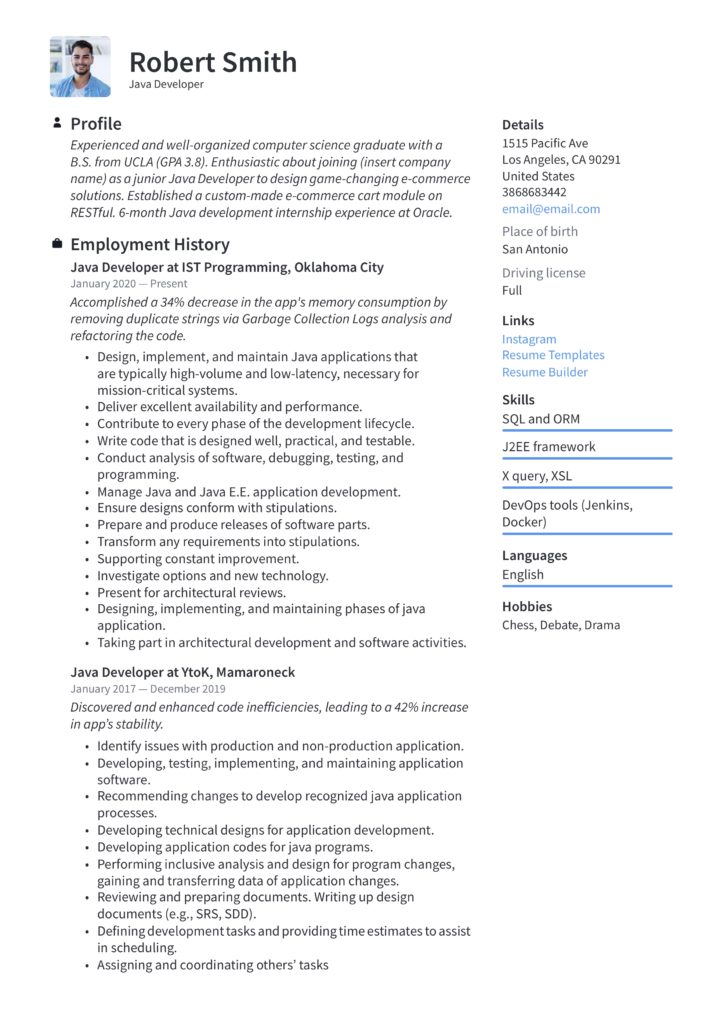
In a landscape where Java developers are highly sought after, it's crucial to tailor your resume to emphasize your proficiency in project management, software development, and related areas. Utilize this comprehensive guide to refine your resume, effectively showcasing your skills and achievements as a Java developer.
What you can read in this article

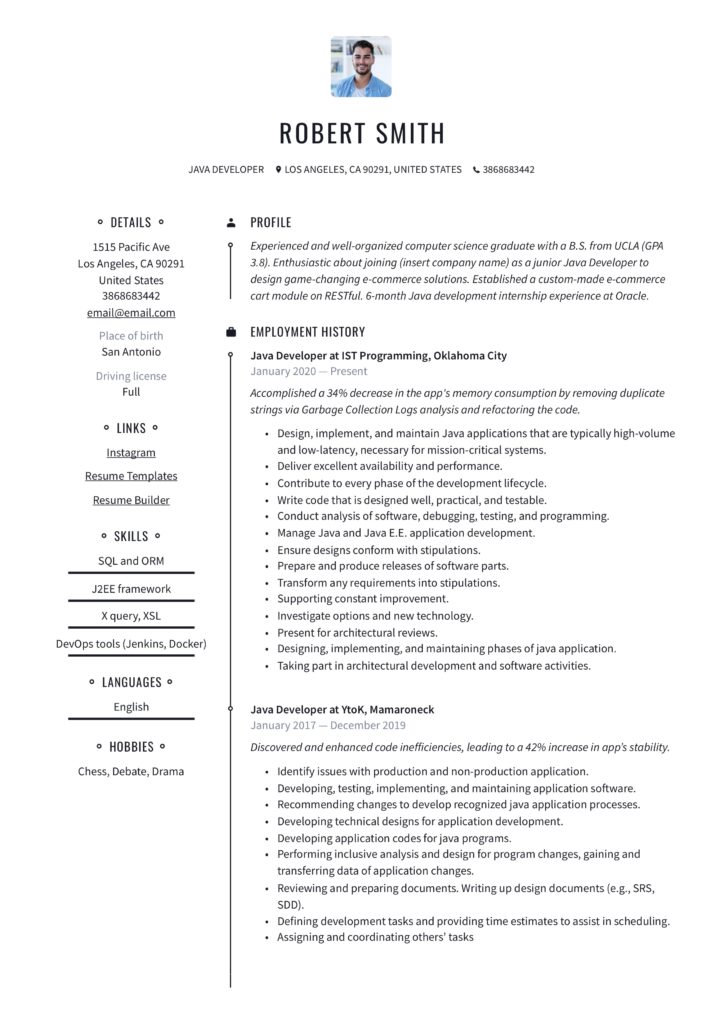
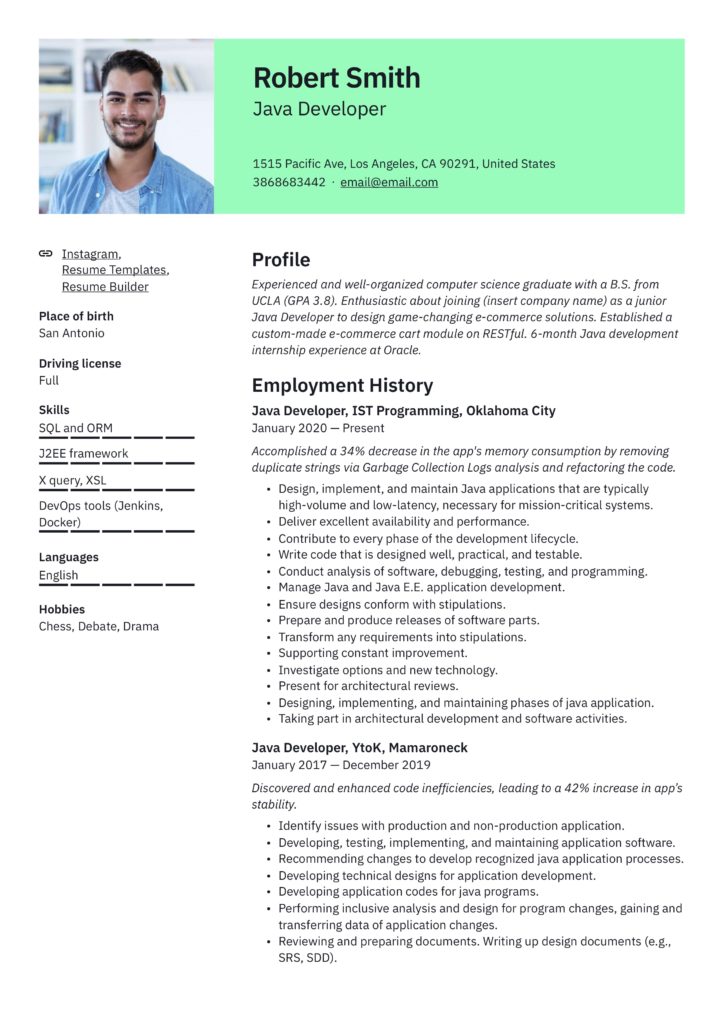
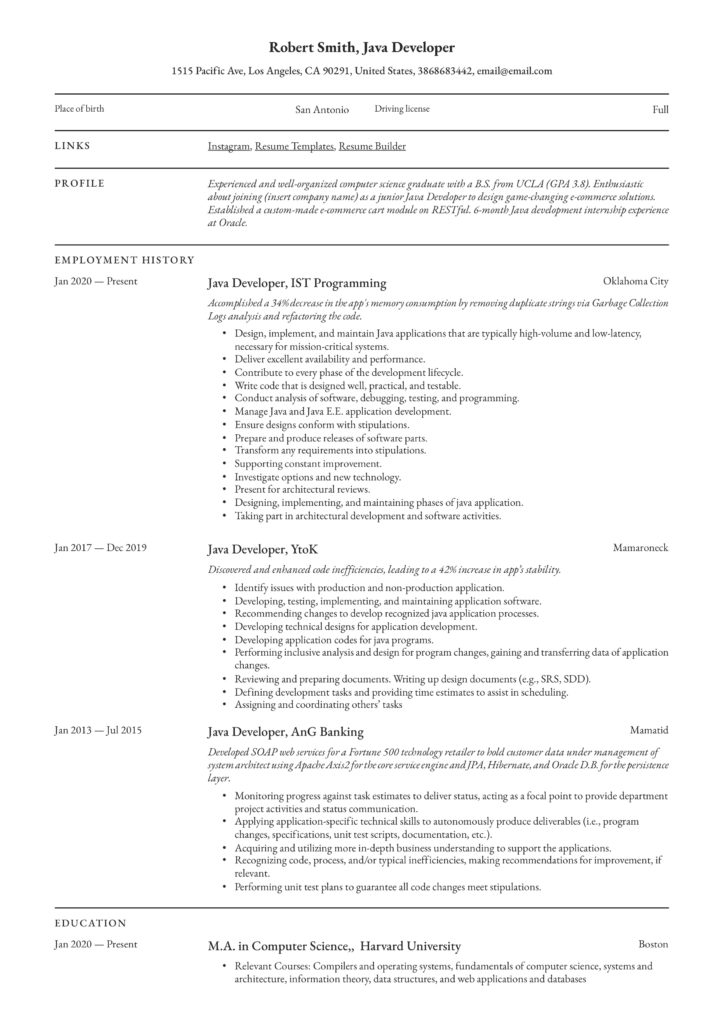
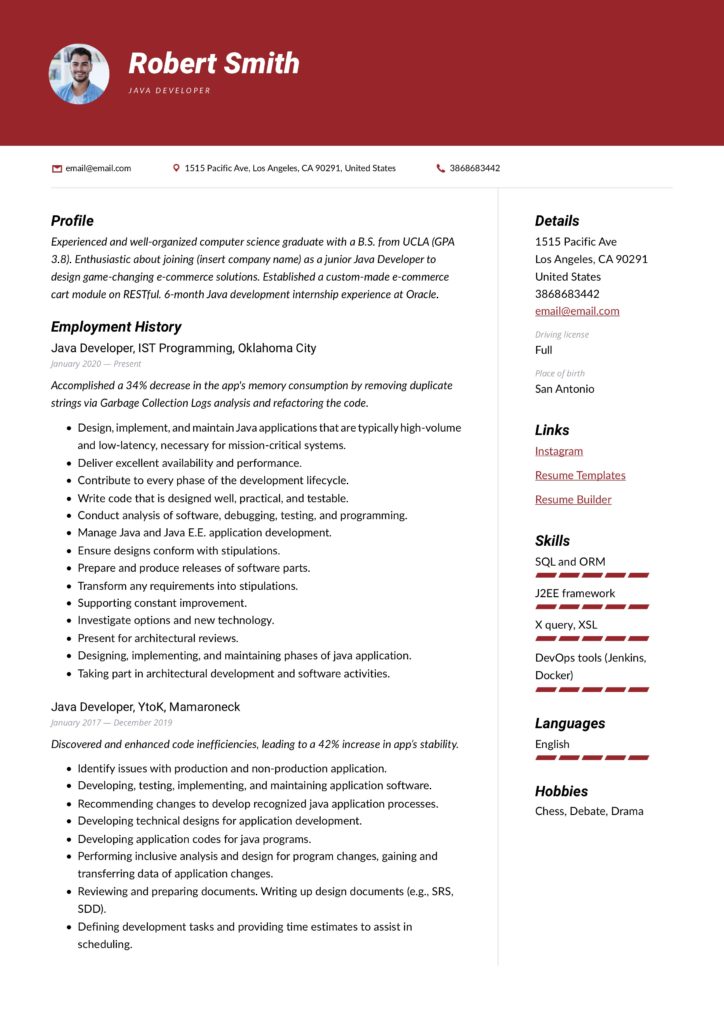
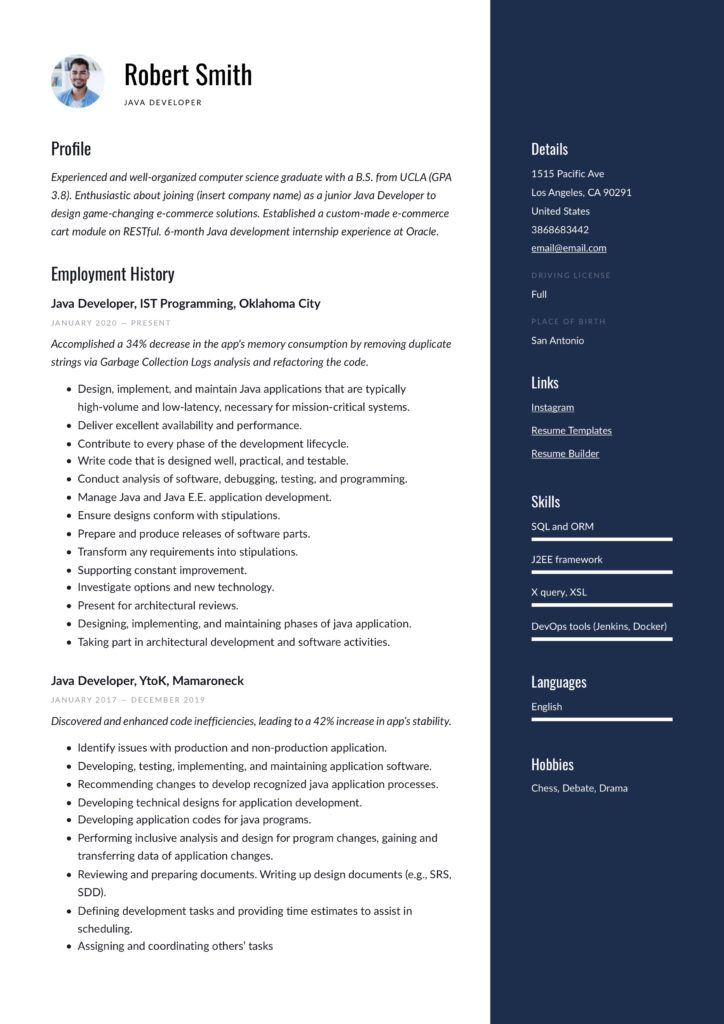
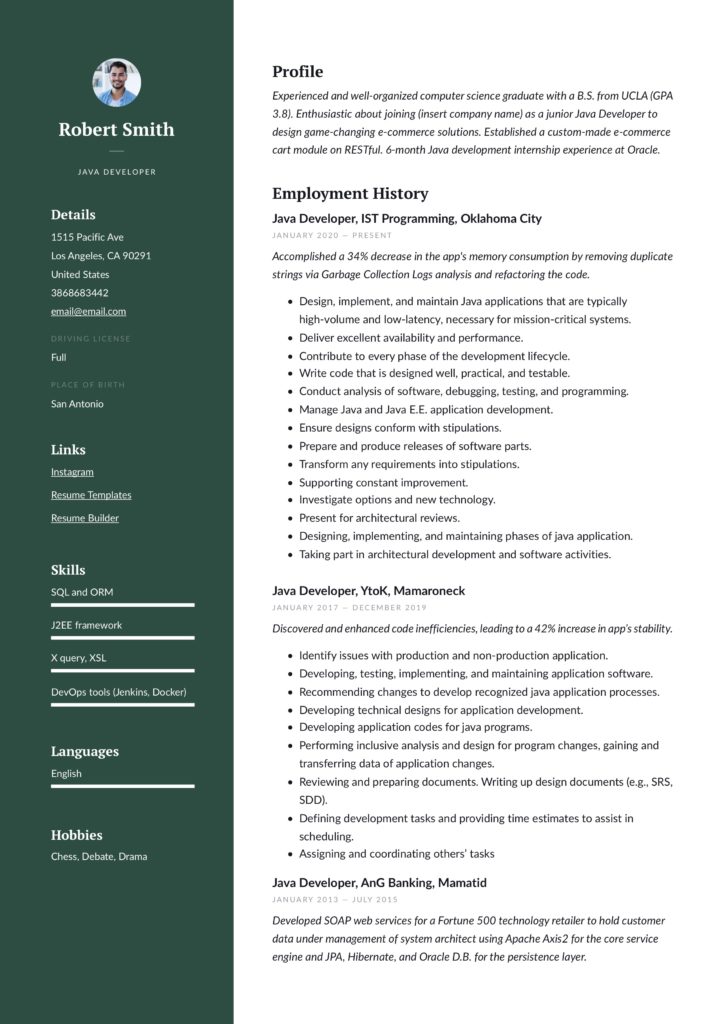
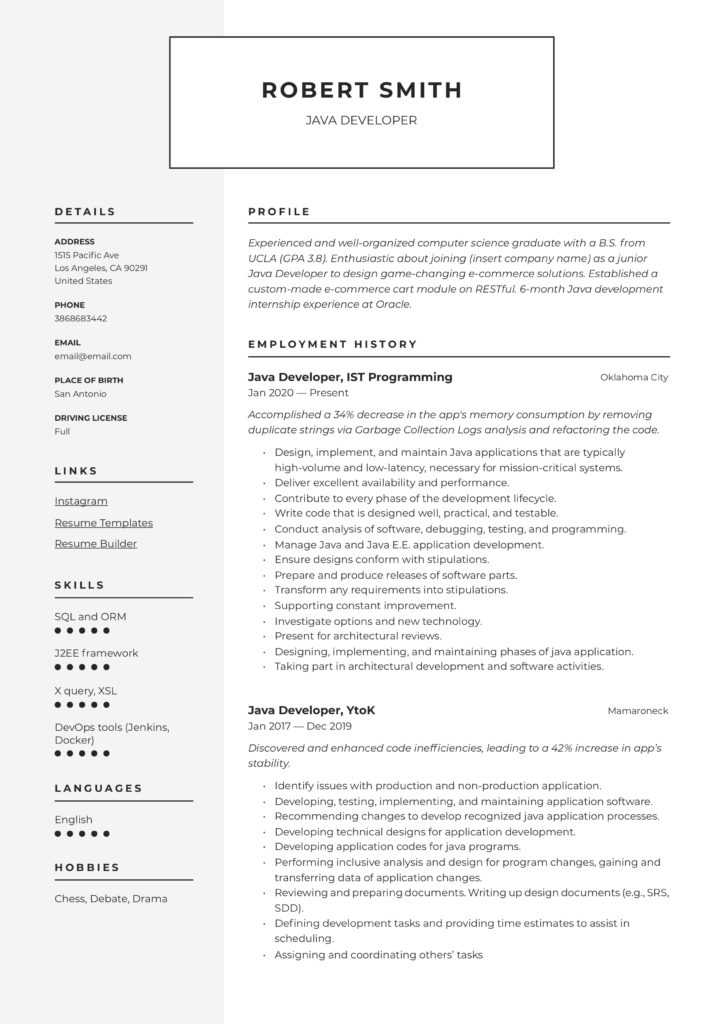
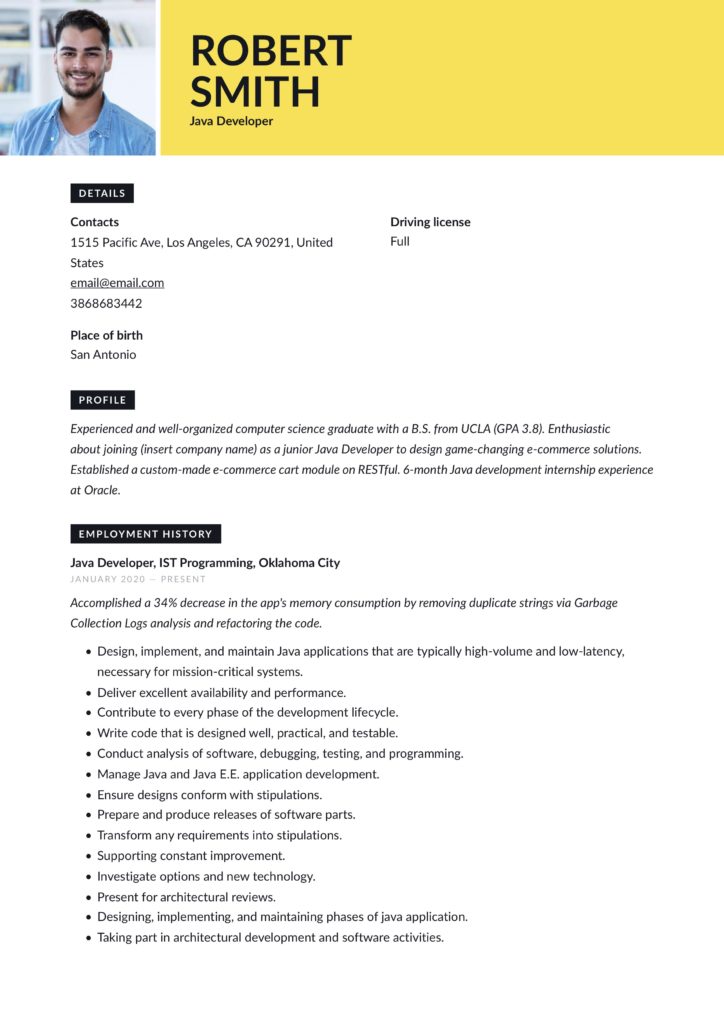
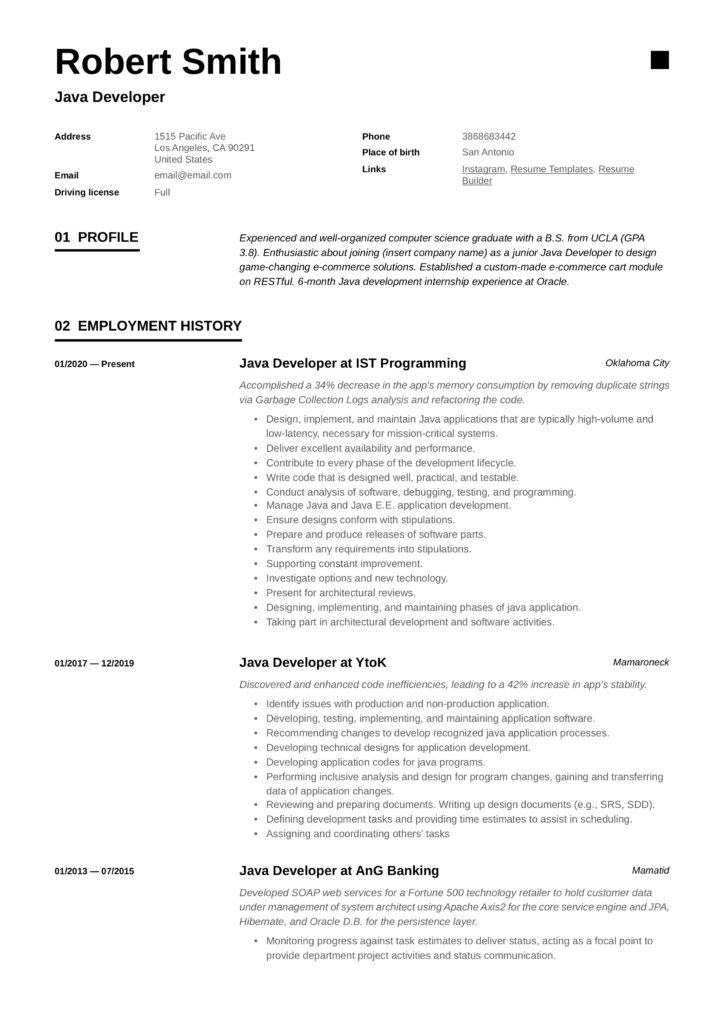
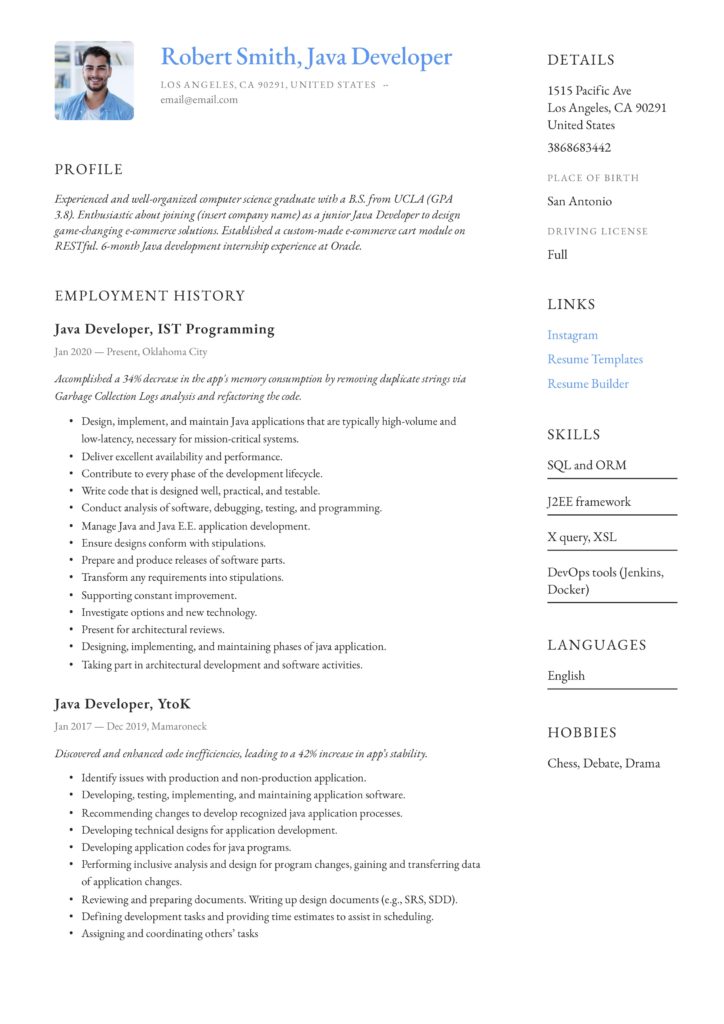
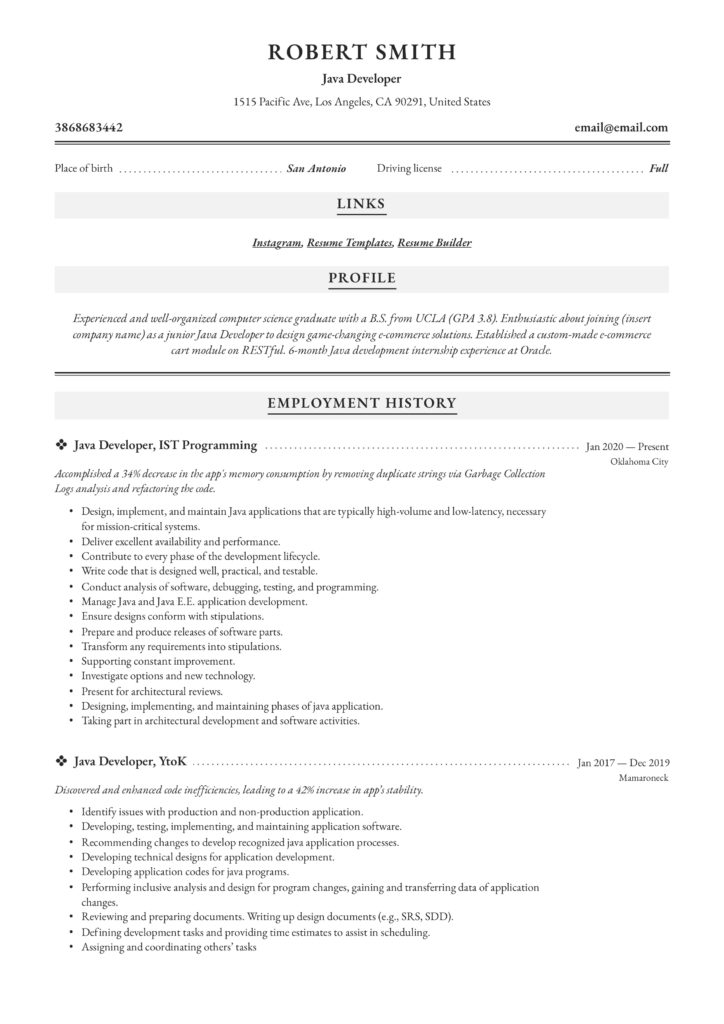
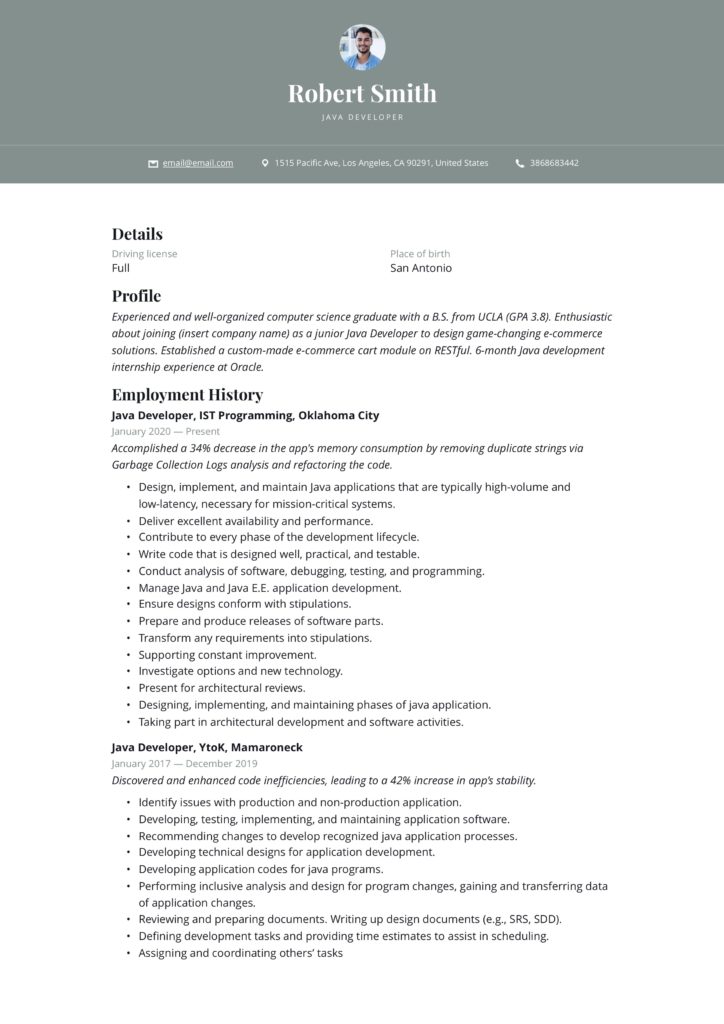
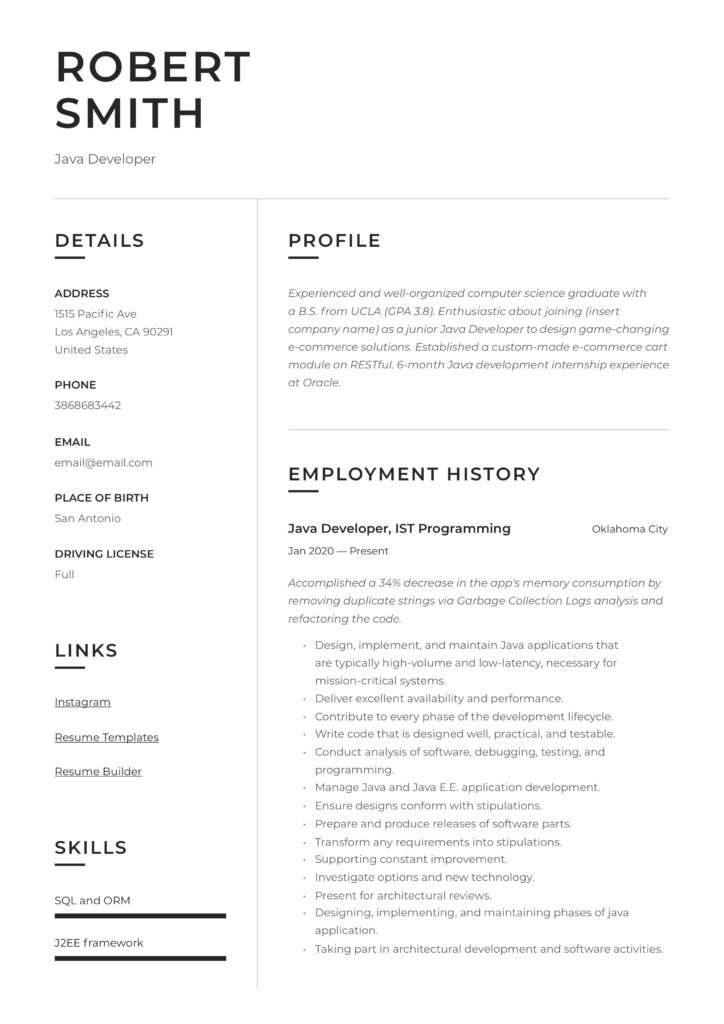
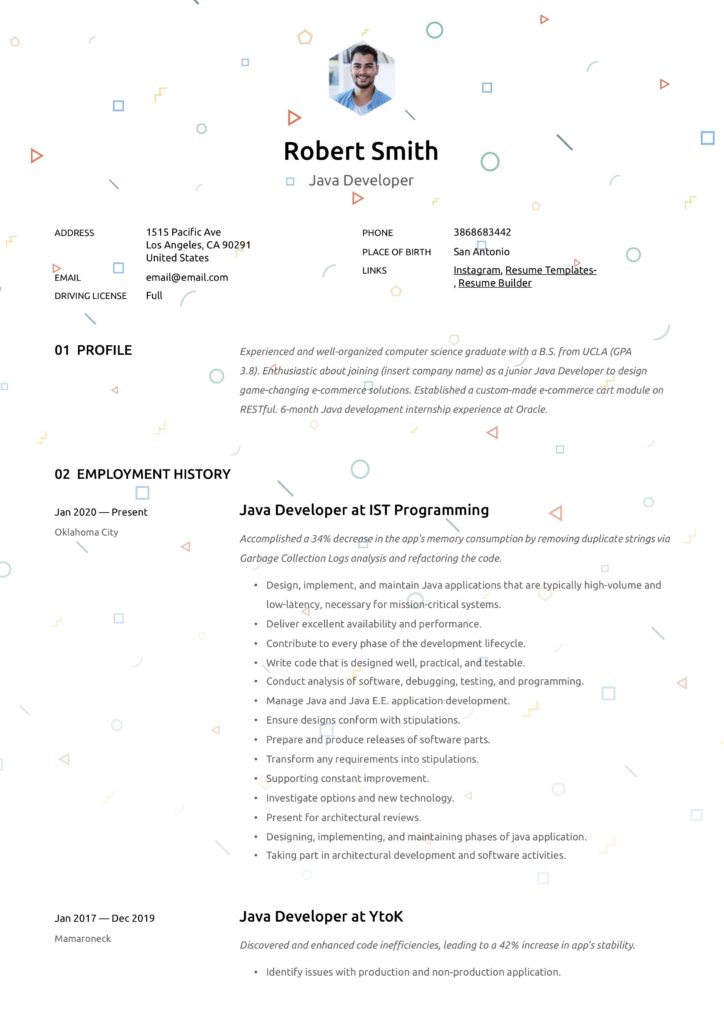
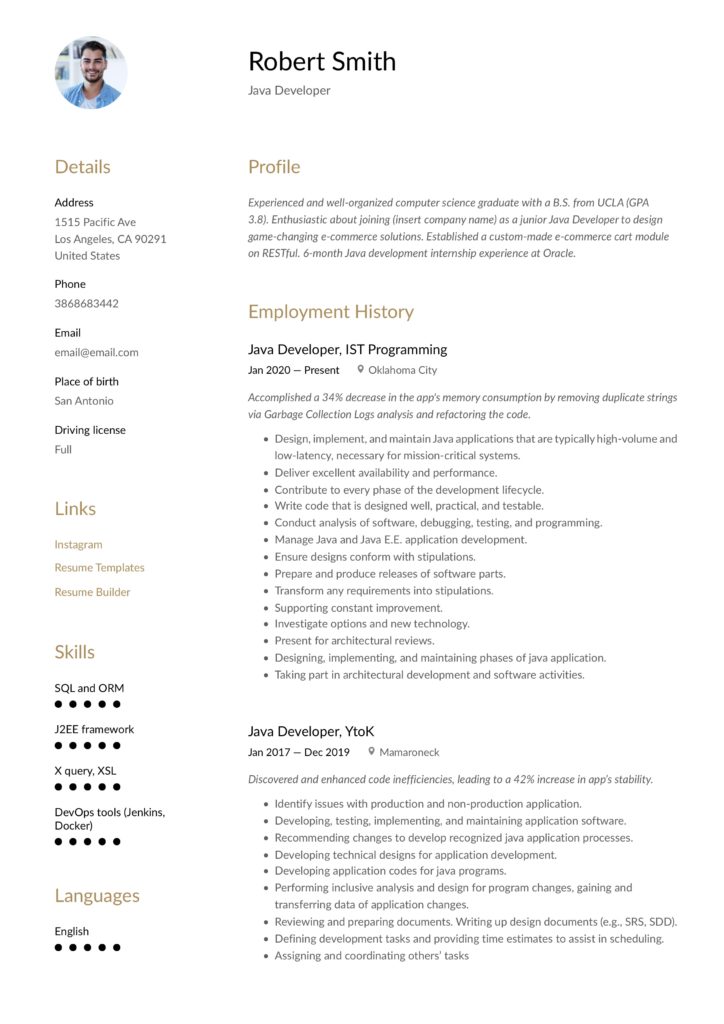
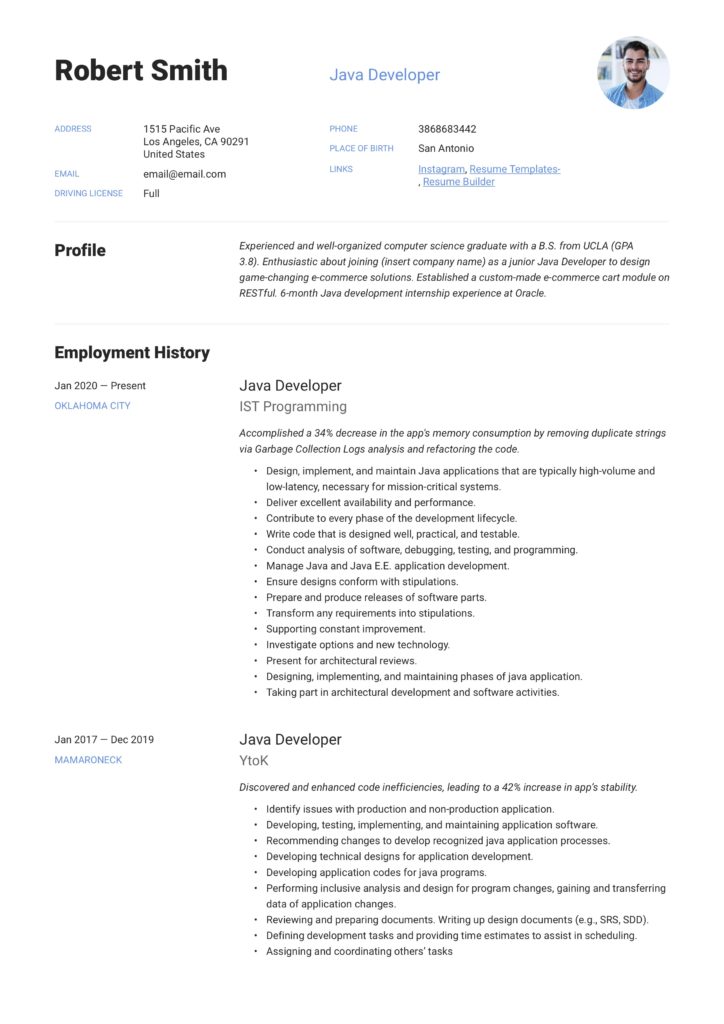
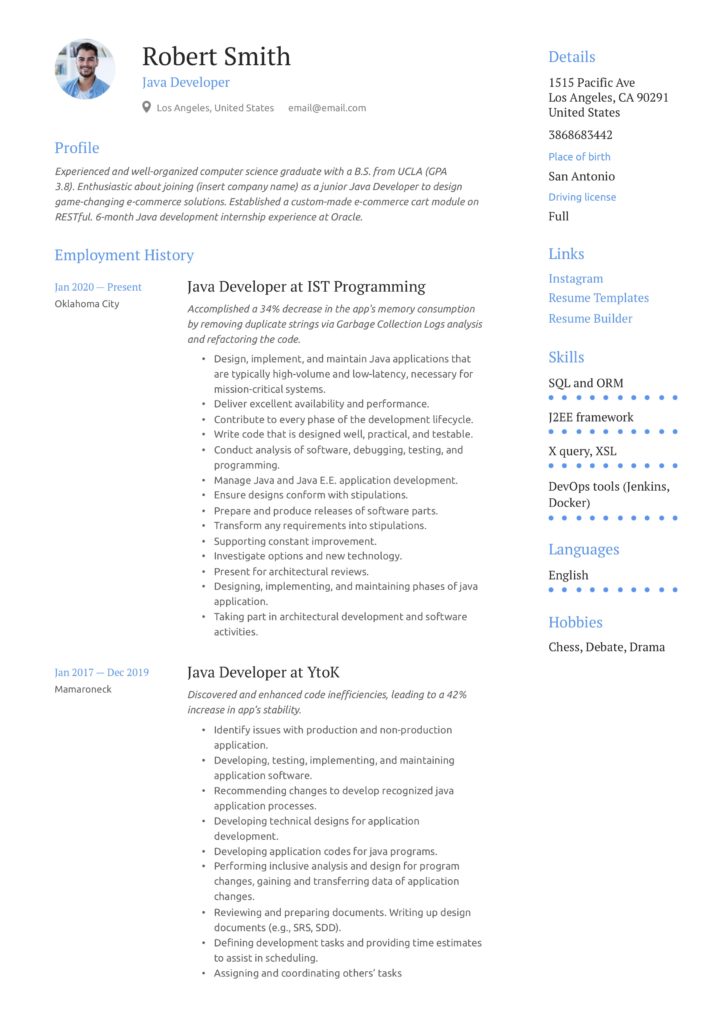
Hiring managers are busy and usually have little time to view all the resumes that end up on their screen. Yourprofile summary must be short, sharp, and to the point. To get their attention instantly, place the essential information in the first sentence of your career summary. Your career profile (or objective) should highlight your most impressive qualifications. It also highlights the competencies and characteristics that make you an outstanding Java Developer and an asset to the hiring company.
Using the job description as a guide to determine what info you should put in the resume is a brilliant idea. If the job ad says it’s looking for skills such as architecture development or designing codes, use the same words in your resume profile as used in the job ad. This will make you seem like a better fit for the company.
Include a sentence that highlights exceptional qualities that will be adding value to the company. Lastly, end off with your education section:
"Determined Java Developer competent in following conventional practices and working under little or no supervision. Offering technical expertise in application analysis, programming analysis, and design. Brilliant team player with in-depth knowledge of development tools and languages. Great JavaScript knowledge base with 5+ years of industry experience as part of a computer program development team. Competent at explaining complex computer development ideas to a variety of audiences clearly."
"Proficient Java Developer with 4+ years of experience in full SDLC creating dynamic web applications. Updates functionality founded on customer desires to guarantee outstanding user experience. Other tenures include: experience includes developing websites, apps, and intricate programs while at University X. Competent in Oracle, PL/SQL, Tomcat Apache, MySQL, Ajax V.B., JavaScript, CSS, ASP, and HTML."
"A senior Java developer with over 10 years of experience specializing in Agile development, technical project management, back-end development, and Oracle. A strong history of leading diverse global teams across all phases of the software development lifecycle. Adept at identifying innovative software solutions and driving new feature development."
Most of the time, what you do as a Java Developer goes well beyond computer programming. There’s a good chance your employer will need you to take part in whole software development lifecycles and striving to develop the overall product by investigating alternate ways and technologies to accomplish the stipulated goals. The employers will want to see proof of the everyday duties all Java Developers should be able to do within your resume.
Your job may be intricate, but your resume must be concise and sharp.
If you choose the right format for the resume, this will summarize your job's intricate nature easier in the resume. We suggest using the “Reverse-chronological” order as it is the most common format for resumes in the professional world.
Below is a list of the crucial duties to help you start writing your job description:
Your goal here is to write what sets you apart from the other candidates, using the things that make you most proud and your accomplishments in previous jobs, in compelling and punchy statements.
Keep your terms clear. If you can interpret code on a daily as a job, you can do exactly that with your achievements so that even the recruiters who aren’t tech-savvy can understand them. Bland and straightforward statements are a definite NO-NO. Calculated, action-driven statements are a YES, PLEASE!
You need to prove your achievement statements by backing yourself up with numbers. Add quantifiable information, for example:
It goes without saying, the education section is critical in your resume. Basically, elaborate on the What, Where, and Whens concerning your qualifications, certifications, or industry licenses that you’ve acquired. These act as your work record and proof of technical competencies.
Side note: don’t leave out any qualifications you’re currently completing! Add that info in as well.
2015 – M.A. in Computer Science, Boston, MA. Harvard University
Relevant Courses: Compilers and operating systems, fundamentals of computer science, systems and architecture, information theory, data structures, and web applications and databases.
2015 – Certified JavaScript, HTML5, and Microsoft; Computer Learning Center, Boston, MA
2015 – Project Management Professional Certification – PMP Global, Online
2012 – 2014 BS in Computer Programming. Washington University in St. Louis, St. Louis, MO
Employers don’t always look for technical skills; they also look for your interpersonal skills. These are your people skills and are called soft skills. Basically, these skills allow employers to see if you will be a good fit for their company. Include these skills into your summary/ profile, and in your accomplishment statements.
An Applicant Tracking System, or ATS, helps recruiters sort through the crazy number of resumes sent to them. The ATS scans resumes for keywords, specifically, the same keywords used in the original job ad. This is why it is paramount your section for resume job description uses the exact keywords from the ad. If you don’t, the ATS will ignore your application. But wait! There’s more! As soon as the ATS deems your resume-worthy, it pops up on the recruiter’s screen.
Now you have to dazzle the recruiter as well. The most effective way to list your skills is using a Skills Matrix table. Make one for all your technical skills and add a level-of-competency in the table. You should also make skills matrix tables for soft skills and characteristics.
| Competency | Expert Level1-Novice, 2-Intermediate, 3-Expert |
| Java-based web services | Level 2 |
| Relational databases | Level 1 |
| SQL and ORM | Level 3 |
| J2EE framework | Level 3 |
| Object-oriented analysis and design | Level 1 |
| JSP | Level 2 |
| Enterprise java beans | Level 2 |
| XML | Level 1 |
| X query, XSL | Level 3 |
| Test-driven development | Level 3 |
| Software design and architecture | Level 3 |
| Microservices | Level 2 |
| DevOps tools (Jenkins, Docker) | Level 1 |
| Spring framework | Level 3 |
| Junit and Mockito | Level 2 |
| Learn APIs and Libraries | Level 3 |
| JVM Internals | Level 3 |
| Design patterns | Level 2 |
| Kotlin | Level 1 |
| React | Level 2 |
| Angular | Level 3 |
| Concurrency | Level 3 |
| Attention to detail | Facilitation | Flexible |
| Team Player | Organization | Adaptable |
| Written Communication | Time Management | Analytical Thinking |
| Verbal Communication | Prioritization | Initiative |
| Reliable | Meticulous | Dependable |
| Punctual | Sound Judgement | Stress Tolerance |
| Trustworthy | Creative Problem-Solving | Persistent |
| Cooperative | Cooperative | Unconventional |
| Task Orientated | Analytical | Independent |
| Certified Scrum Master (CSM | J Certified Scrum Master | Ava SE 6 programmer |
| Oracle certified java programmer | Oracle certified professional | Salesforce.com certified administrator |
| SCJP | Sun Certified Java programmer | Sun certified web component developer |
| PMP | B.Sc. Computer programming | Spring professional certifications |
| Apache spark developer certification- HDPCD | Microsoft Azure solutions certification | Project management professional certification |
Sectors: Various
Career Type: Development, Coding Information Technology, Computer Science, Engineering, Programming, Architecture, Networks
Person type: Writer, Debugger, Coder, Creator, Implementer, Designer, Developer, Facilitator, Fixer
Education levels: From Bachelor’s Degree upwards
Salary indication: From $104 561 (Indeed)
Labor market: Between 10% and 21% from 2018 – 2028 (Learn.Org)Organizations: All